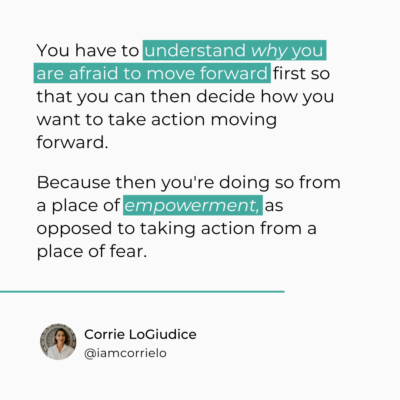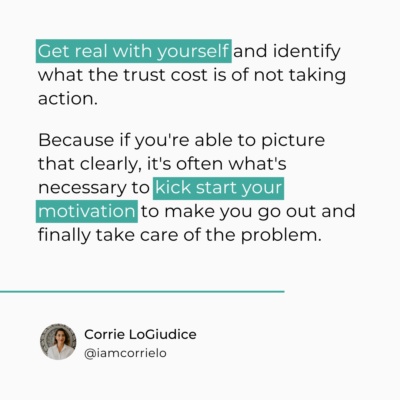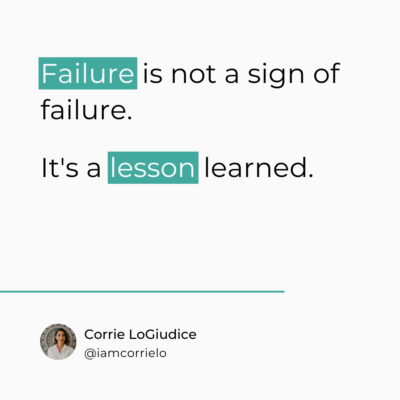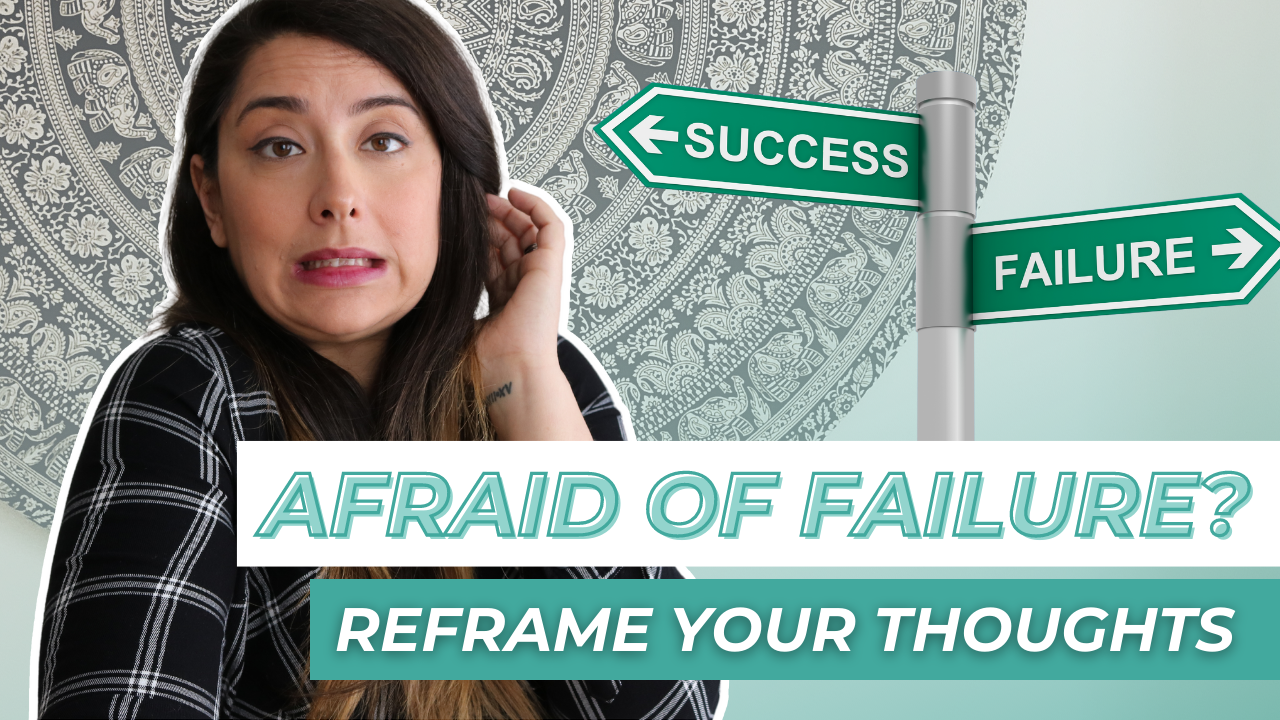Is your fear of failure keeping you stuck in inaction?
Fear of failure is one of the most commonly cited fears of aspiring and brand new entrepreneurs. It can even paralyze the smartest, most experienced business owners.
But what if I told you that you could stop it right in its tracks using the power of your thoughts?
If you’re ready to take back control over your life and make a positive change for yourself, then let’s talk about the two strategies that will not only help you cope but move past your fear – so you can finally start taking action on the things you’ve dreamt of accomplishing.
But first, you need to know that…
Moving past the fear of failure will require you to reframe your thinking around two specific areas, and these are:
- Before you fail; and
- After you fail
Conquer Your Fear of Failure: Before You Fail
“I want to achieve x, but I’m afraid of failing.”
“I would love to be able to reach x, but what if I fail?”
We’ve all heard of these things before, right? We’ve heard it from our friends and family. You probably even heard these things from yourself!
Having a fear of failure before we ever get to do anything is not a stranger to us. But just like any kind of fear, it’s nothing more but an illusion.
It’s simply a thought pattern that has been programmed into our brains since childhood. And as long as we continue to believe it, it’ll keep coming up again and again.
So how can we break free from this cycle?
Before we can answer that one, let’s answer this first…
What’s the worst that can happen?
Now, I know it’s not a question that you can answer at once, but the best way to get there is to break this down further so it becomes much more manageable and easier to digest.
Here are a few steps you can do so:
Step 1: Figure out where your fear stems from.
Fear can come from many things, and most of the time, we’re not aware of why exactly we feel the way we do. So the first step towards conquering your fear of failure is to figure out where the fear stems from.
You might have some ideas already, or maybe you don’t. Either way, here are a few coaching questions that can help you out with this:
- Is your fear stemming from potentially making the wrong decision?
- Are you afraid of disappointing somebody?
- Are you scared of looking like a fool, an idiot, or an imposter?
Now, you need to keep in mind that these are all valid fears and thoughts, but you also have to understand why you are afraid to move forward first so you can truly move forward. Why? Once you know where your fears come from, you’ll be making a conscious decision from a place of empowerment instead of a place of fear.

Step 2: Know the true cost of inaction.
It’s a common belief that doing nothing won’t hurt you. That might be true, but inaction comes with a cost. The truth is that when we choose to stay stuck in our comfort zone, we’re missing out on opportunities that could benefit us greatly.
For one, inaction could mean a monetary cost. Sometimes, it comes in the form of mental health, or it might cost your career. There are many different areas that could be affected and ultimately impacted when you fail to take action on something just because you were scared to do so.
So, get real with yourself, dig deep, and determine what inaction will cause you. And when you do, you might be able to get past your fears and start taking action.

Step 3: Identify the absolute worst-case scenario.
Ask yourself, what’s the worst that could happen if you take action?
For example, you might be having second thoughts about starting your own business because you’re afraid to leave the security of your job. Perhaps, you’re uncertain about how you’ll provide for your family. Or maybe, your spouse won’t fully support you in this new endeavor.
You must know that these are entirely valid thoughts and fears – and they’re not something you should ignore. But, you also need to realize that you need to be clear on these thoughts before taking action. Remember, when we take on something challenging, such as this, we need to come from a place of power – and not from fear.
Now, let’s go back to the previous example.
Let’s say you went with your gut and decided to quit your job to start your own business. If it doesn’t work out, you have a few more options. If everything else fails, you can always just look for another job! Come to think of it, that’s not the absolute worst-case scenario!
My point is that you always have a choice. If you have a plan, you should always have a backup plan to prevent the possible worst-case scenario. This means that even if things don’t turn out exactly the way you planned, you still have options.
So, if you’re planning on starting a business, make sure that you have a Plan B, a Plan C, or even a Plan D, so you won’t drain your bank account and not be able to provide for your family. This way, you can free yourself from the fears that hold you back.
Conquer Your Fear of Failure: After Failing
Let’s say you’ve conquered your fear, taken action – and failed? Now what?
The key to making this entire process work is your mindset.
You may have failed, but your experience wasn’t a failure; it’s a lesson.
You just need to keep in mind that there’s a lesson to be learned in everything you do. Here are a few questions you can ask yourself to help you figure out what those lessons are.
1. What worked?
I get it. When we fail at something, it’s easy to dismiss it as a failure and move on as fast as we possibly can. But the truth is, there’s a lot that you can learn from the process if you try to break down and analyze the situation. There has to be a silver lining, and that’s what you need to look for each time you encounter a failure.
So ask yourself, among all the things you did, which ones worked?
2. What didn’t work?
Of course, there’s a reason why you failed, and you need to know what it was. You need to understand what you did wrong to avoid doing it again. You should also determine what needs improvement so you can try again.
It’s important to note that sometimes, our failures are not entirely our fault. We may have been given bad advice or had an unfair set of circumstances. But the reality is that there will always be variables that you won’t be able to predict or be able to plan for. Come to think of it, if the circumstances were beyond your control, did you really fail?
Being aware of your limitations allows you to detach from that particular situation. You’ll feel less of a failure, be able to accept and acknowledge your mistakes, and then move forward.

3. What will you do differently next time?
I like to joke that entrepreneurs are essentially professional failures – because the most successful ones keep trying until they succeed.
Remember, a failure isn’t really a failure unless you give up. As long as you are always learning, you will always move towards what you want and ultimately end up exactly where you want to be.
So, when you fail, you need to take what you learned and apply it to the next attempt. That’s where true learning is, and it’s how you grow as an entrepreneur.
In Conclusion
Now that you learned a couple of reframing tips to help you conquer your fear of failure, and become more resilient, let me leave you with one final thought.
Most people who start their own businesses don’t know what they’re getting into. They’re afraid of failing and losing money, and they’re scared of making mistakes. All of these fears, if left unchecked, can cause us to procrastinate, make excuses, and end up giving up before actually starting.
If this sounds like you, don’t worry. I have the perfect resource for you. It’s called the Entrepreneurial Mindset Quiz, and it helps you determine whether you’ve already got the mindset needed to be an entrepreneur.
And even if you don’t at this time, it will give you a clear picture of what skills you’ll need to build to find freedom and flexibility as an entrepreneur.
And the best part? It’s 100% free. Click here to take the Entrepreneurial Mindset Quiz.
Thanks for reading, and I hope to see you in my next post!


